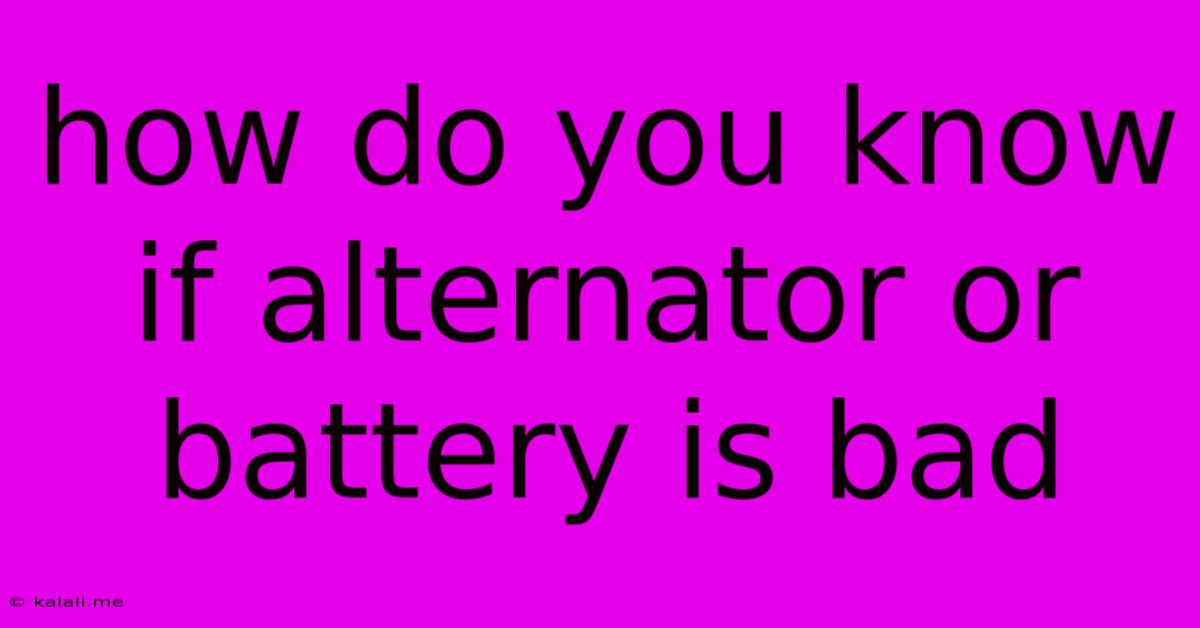How Do You Know If Alternator Or Battery Is Bad
Kalali
Jun 04, 2025 · 3 min read

Table of Contents
How Do You Know If Your Alternator or Battery is Bad?
A dead car battery is a frustrating experience, leaving you stranded and potentially late for important appointments. But the culprit isn't always the battery itself. Often, a faulty alternator is the real problem. Knowing the difference between a bad battery and a bad alternator is crucial for quick and effective troubleshooting. This guide will help you diagnose the issue and get back on the road.
Understanding the Relationship Between Your Battery and Alternator
Your car's battery and alternator work together. The battery provides the initial power to start your engine, while the alternator recharges the battery while the engine is running and powers your electrical system. A problem with either component can leave you with a dead battery and a non-starting car.
Signs of a Bad Battery:
Several symptoms point towards a failing battery. These include:
- Dim headlights: Weak or flickering headlights are a classic sign of a low battery charge.
- Slow engine cranking: If your engine cranks slowly or struggles to turn over, your battery may not have enough power.
- Clicking sound when turning the key: This indicates the battery doesn't have enough power to engage the starter motor.
- Dashboard warning light: Many vehicles have a battery warning light on the dashboard that illuminates when the battery is low or there's a problem with the charging system.
- Battery age: Car batteries typically last 3-5 years. If yours is older than that, it's more likely to fail.
- Corrosion on battery terminals: White, powdery buildup on the battery terminals indicates corrosion which can hinder power flow.
Signs of a Bad Alternator:
A failing alternator won't always immediately cause your car to stop. Instead, you might notice these symptoms:
- Dashboard warning light: The battery warning light, as mentioned above, can also indicate a problem with the alternator.
- Electrical problems: Problems with power-hungry accessories like headlights, radio, or power windows, especially when the engine is running.
- Battery constantly needing a jump: If your battery frequently needs a jump start, even after it's been fully charged, this strongly suggests a problem with your alternator. The alternator isn't recharging the battery effectively.
- Strange noises from the alternator: A whining or grinding noise coming from the alternator is a tell-tale sign of internal problems.
- Smell of burning rubber or plastic: This could indicate overheating within the alternator.
How to Diagnose the Problem:
While visually inspecting the battery for corrosion and checking the age are easy steps, determining if the alternator is at fault requires a more thorough approach. However, you can perform a simple test:
- Check the battery voltage with a multimeter: With the engine off, measure the battery voltage. It should be around 12.6 volts. A lower reading indicates a weak battery.
- Check the voltage with the engine running: Start the engine and measure the voltage again. The reading should be around 13.5-14.5 volts. A significantly lower reading suggests the alternator isn't charging the battery correctly.
Important Considerations:
- Professional help: If you're not comfortable performing these checks or if you're unsure of the results, it's best to take your car to a qualified mechanic for diagnosis and repair.
- Safety first: Always disconnect the negative battery terminal first before working on your car's electrical system.
By carefully observing the symptoms and performing a simple voltage test, you can often pinpoint whether the problem lies with your battery or alternator. Early detection and prompt repair can prevent further damage and keep you from unexpected breakdowns. Remember that preventative maintenance, like regular battery terminal cleaning, can prolong the life of both components.
Latest Posts
Latest Posts
-
This Mac Does Not Support Boot Camp
Jun 06, 2025
-
Can You Remove Enchants From A Items Onto A Book
Jun 06, 2025
-
Line Parallel Draw A 12mm Line
Jun 06, 2025
-
How To Clean Fouled Spark Plugs
Jun 06, 2025
-
He Did A Number On Him Meaning
Jun 06, 2025
Related Post
Thank you for visiting our website which covers about How Do You Know If Alternator Or Battery Is Bad . We hope the information provided has been useful to you. Feel free to contact us if you have any questions or need further assistance. See you next time and don't miss to bookmark.